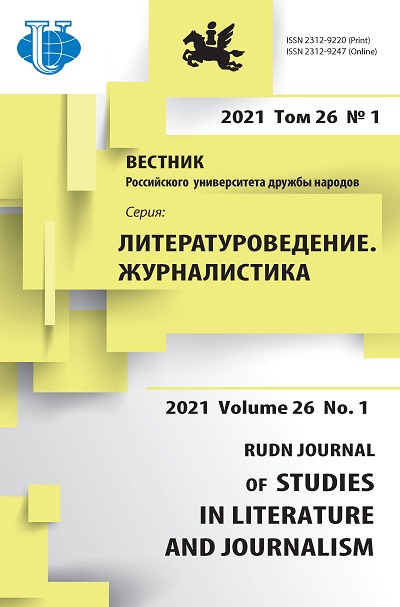The Affordances of the Information and Communication Universe, or Who is Behind the Mass Media
- Authors: Dzyaloshinsky I.M.1
-
Affiliations:
- HSE University
- Issue: Vol 26, No 1 (2021)
- Pages: 92-98
- Section: JOURNALISM
- URL: https://journals.rudn.ru/literary-criticism/article/view/26081
- DOI: https://doi.org/10.22363/2312-9220-2021-26-1-92-98
- ID: 26081
Cite item
Full Text
Abstract
This article examines the specifics and perspectives of the information and communication universe theory for the analysis of the mass media. The aim is to explain the application of the concept of “affordance” in the context of media theory. The term was introduced by psychologist James J. Gibson to describe the specific “inviting” nature of objects and events, which, through affordances, suggest an algorithm for subsequent actions. From this point of view, the information and communication universe makes it possible to use it for some important purposes for the subjects of communication. However, the quality and options for implementing the possibilities of affordance depend on the goals, interests and skills of the subject who is trying to work with this affordance. To use an analogy, the same axe could “invite” some people to chop wood for an old lady, and others to use it as a weapon against her in order to seize her pension benefits. The thesis on the functional usefulness of the category “information and communication universe” for the analysis of processes in the media system is put forward. Traditional ideas about the specifics of the production and consumption of texts are corrected. The author analyzes the affordances of the Internet as a subsystem of the information and communication universe. It helps to explain the radical differences in the assessment of network digital technologies by representatives of different research schools. The article outlines further prospects for the identification and use of hidden affordances.
About the authors
Iosif M. Dzyaloshinsky
HSE University
Author for correspondence.
Email: idzyaloshinsky@hse.ru
Doctor of Philology, Research Professor of the Faculty of Communications, Media, and Design
2/8 Khitrovsky Pereulok, bldg 5, Moscow, 10100, Russian FederationReferences
- Propp, V.Ja. (1998). Pojetika fol'klora [The Poetics of folklore]. Moscow, Labirint Publ. (In Russ.)
- Anisimov, A.V. (1991). Komp'juternaja lingvistika dlja vseh: Mify, algoritmy, jazyk [Computational linguistics for all: Myths, algorithms, language.] Kiev, Naukova dumka Publ. (In Russ.)
- Simonov, P.V. (1993). Sozidajushhij mozg: Nejrobiologicheskie osnovy tvorchestva [The creative brain: The neurobiological foundations of creativity]. Moscow, Nauka Publ. (In Russ.)
- Fedotova, S.L. (2012). Tajnye uragany [Secret hurricanes]. Perm'. (In Russ.)
- Rashkoff, D. (2003). Mediavirus. Kak pop-kul'tura tajno vozdejstvuet na vashe soznanie [Media virus! Hidden agendas in popular culture]. Moscow: Ul'tra. Kul'tura Publ. (In Russ.)
- Stepin, V.S. Samorazvivajushhiesja sistemy i postneklassicheskaja racional'nost' [Self-developing systems and post-nonclassical rationality]. Biblioteka po filosofii [Library of philosophy]. Retrieved August 19, 2020, from http://filosof.historic.ru/books/item/ f00/s00/z0000249/ (In Russ.)
- Zittrain, J. (2008). The future of the Internet – and how to stop it. New Haven, CT; London, Yale University Press.
- Zittrain, J. (2005). The generative Internet. Harvard Law Review, 119(7). Retrieved March 12, 2021, from https://dash.harvard.edu/handle/1/9385626
- Asmolov, G.A., & Asmolov, A.G. (2019). Internet as a generative space: Historical and evolutionary perspective. Voprosy Psihologii [Psychology Issues], (4), 3–28. (In Russ.)
- Asmolov, G.A., & Asmolov, A.G. (2009). From We-media to I-media: Identity transformation in the virtual world. Voprosy Psihologii [Psychology Issues], (3), 3–15. (In Russ.)
- Gibson, J. (1988). Jekologicheskij podhod k zritel'nomu vosprijatiju [The ecological approach to visual perception]. Moscow, Progress Publ. (In Russ.)
- Norman, D. (2013). Dizajn veshhej budushhego [The design of future things]. Moscow, Strelka Press. (In Russ.)
Supplementary files















